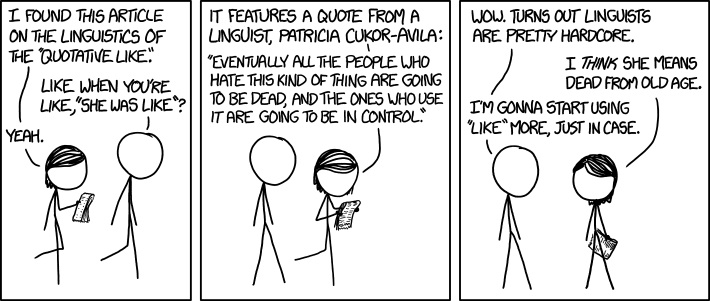|
ESL Forum:
Techniques and methods
in Language Teaching
Games, activities
and teaching ideas
Grammar and
Linguistics
Teaching material
Concerning
worksheets
Concerning
powerpoints
Concerning online
exercises
Make suggestions,
report errors
Ask for help
Message board
|
ESL forum >
Grammar and Linguistics > WHY does this sentence have to be correct? :)
WHY does this sentence have to be correct? :)
|

Gi2gi

|
WHY does this sentence have to be correct? :)
|
|
I think many natives would confirm that there �s nothing wrong with this sentence. � She suggests that he go home� � so, it �s clear that we have an object clause, and the tense is PRESENT SIMPLE, 3rd PERSON SINGULAR � so, why do you still say � She suggests that he go home.. � Hopefully, I get an answer to this before I am asked by my curious crazy boys and gals, coz soon we are talking about reporting verbs . �  |
5 Feb 2015
|
|
|
|

1lh4n

|
|
This sentence is a subjunctive clause. True form of the sentence is: She suggests that he SHOULD go home. , but in subjunctive clauses should is omitted so it is used as " she suggests that he (should) go." You can find more information on this website: http://www.englishpage.com/minitutorials/subjunctive.html
|
5 Feb 2015
|
|
|

Gi2gi

|
|
Thanks.As for the subjunctives, I know all the standard cases perfectly, it is the odd case above that makes me wonder, and the explanation that the omission of "should" justifies the case leaves more to be desired, for me at least. Why do we omit the "should"? Are there other structures like this? If should is "omitted", then we have a finite verb form of "go" and clearly it should take the form "goes" (meaning he goes)... Hopefully, i will get more insights.
|
5 Feb 2015
|
|
|

cunliffe

|
|
It is the subjunctive, rarely used in English and I don �t think it has anything to do with �should �. He is not actually going home; it �s a wish or a command and that - I suggest that he go home - is the subjunctive form. Many people, slightly less educated than us lot ;-)) say �I suggest he goes home. � |
5 Feb 2015
|
|
|

ueslteacher

|
|
Also, you can use past simple after suggest as well as a gerund. She suggests that he go home. (bare infinitive) She suggests that he went home. She suggests that he should go home. She suggests going home. (a slightly different meaning though) But NEVER She suggests him ... suggest something TO somebody suggest somebody FOR something |
5 Feb 2015
|
|
|

cunliffe

|
|
Hi Sophia, she suggested that he went home. |
5 Feb 2015
|
|
|

Peter Hardy

|
|
This calls for a reminder that people don �t speak English (or any other language) according to the rules. The rules were made up some time ago according how the people spoke back then. We also know that languages are a �living thing � (apart from Latin) and as such it changes constantly. But we don �t change the rules (at all). My toes still curl when I hear the Americans using "He do" instead of "He does" and so on. Well, us Aussies ain �t much better when we say "What you doing?" In short, GiGi, it �s a virtue to be as flexible as possible. Especially regarding the so-called rules. |
5 Feb 2015
|
|
|

douglas

|
|
Good point Peter--something to always keep in mind when teaching English. I say that learning rules is for passing tests, not for learning to speak fluently. |
6 Feb 2015
|
|
|

Gi2gi

|
|
Thanks lynne, pita, and douglas for your opinions, there are some things I disagree with u about... as a non-native speaker I have the advantage of knowing the dufficulties associated with ESL teaching from the perspective that I have, at some stage, had the same issues of language learning as the esl students do. (I support wholeheartedly the thesis that the best teacher is the one who learns)and, I daresay, what you take for granted, HAS TO BE EXPLAINED to ESL students, and rules are just part of our teaching strategy, proven and useful. DIS IZ GUD BEKOZ ME SAY SO approach is the thing i favo(u)r the less. :) To come back to the topic, I have done a little research on the pseudo subjunctive (i did use the word "pseudo" on purpose) and, whenever my time allows me, I will come back to this issue with a new topic. Once again, thanks for your responses. Have a great time of the day.
|
6 Feb 2015
|
|
|

almaz

|
|
I think some of you guys are confusing grammar with usage. There �s generally little dispute about the rules of English grammar - especially the grammatical form (syntax and morphology). And these rules do alter over time as even a cursory glance at Chaucer would tell you, so I �m a wee bit flummoxed by "rules were made up some time ago according to how the people spoke back then". When was this golden era? It also tends to help if a teacher of English is familiar with those rules, whether it �s for passing exams or not. Usage, though, has as much to do with style, choice and social context as it has with grammar. I might not like a particular usage, but I �m damned if I �m going to condemn it simply because it �s non-standard, dialectal or somehow contrary to my linguistic prejudices. I think today �s XKCD says it much better than I can: |
6 Feb 2015
|
|
|

Peter Hardy

|
|
Dear Almaz, the golden era of English grammar started some time after the invention of the book-press, in the late 15th century. For the next four centuries, starting in 1586 by a guy called William Bullokar, they tried to prove English was like Latin: bound by rules. The fact that people at either side of the Thames couldn �t communicate with each other, let alone with those from all other parts of the country, was clearly forgotten. Many linguists indeed condemned parts of the spoken language because t was just not the standard, too dialectal or against their linguistic prejudices. English became systematized in the late 19th century by continental linguists. The last great work on the English grammar, in the early 20th century, was done by ......... Danish and Dutch linguists. As such we can blame others rather than the English themselves for all the exceptions to every single rule. I just kept it a bit shorter in my previous reply :-( I agree with you that teachers should be familiar with grammar. And as grammar means �writing � it �s quite important when you want to sit tests or write articles, essays and the like. My point was that we shouldn �t become grammar slammers. Learning to communicate in English is far more important for most of our students, in my humble opinion. Gigi, I always tell my students that English is a rubbish (bin) language, because it �s made up from a dozen other languages. I show them YouTube clips on accents (Amy Walker �s Dr Seuss is marvellous), and clips about the differences between American, British and Australian English. And showing a few clips of our politicians stumbling helps to explain that even native speakers have problems, does wonders, too. In short, it �s not "bcuz me sai zo, but bcuz thay sai zo". Cheers, |
6 Feb 2015
|
|
1
2
Next >
|

















